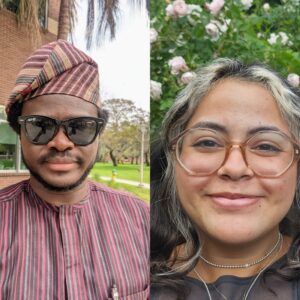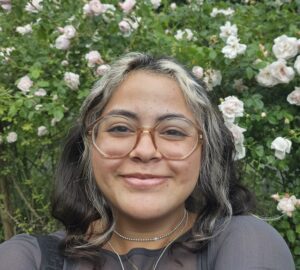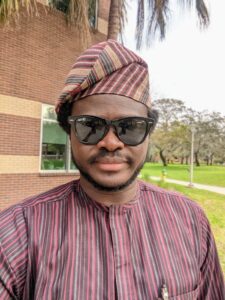
Completing higher education can be a daunting but rewarding endeavor, even more so when you travel to another country to a pursue it. Two international students, Karen Sanchez Crespo from Venezuela and Tolulope Ogunride from Nigeria, know firsthand what this experience can entail. Sanchez Crespo came to the U.S. as a Venezuelan high schooler and decided to continue her journey to UCF since they offered a graphic design major, which is what she wanted to do in Venezuela. Ogunrinde, a Nigerian MFA student who recently successfully defended his thesis and is graduating this Spring, is deeply committed to themes of womanism and patriarchy in his native country with his feature film “Path to Yesterday.” Both Sanchez Crespo and Ogunrinde talk about what inspired them to choose their degree paths, why they chose to come to UCF, and their biggest cultural or academic adjustments they faced as international students.

Karen Sanchez Crespo
Karen Sanchez Crespo’s international experience began as early as high school here in Orlando. After graduating from high school, Sanchez Crespo decided to continue her education at Valencia College. Thanks to the support of the prestigious Seneff Honors College, she earned a full ride through Valencia and began laying the foundation for her future in graphic design.
Initially drawn to UCF for its graphic design program, Sanchez Crespo soon discovered that the Games and Interactive Media program at NSCM had the degree that better aligned with her interests: the Digital Media BA, Web and Social Platforms track. It was the perfect fusion of creativity and technology, combining the artistic aspects of design with the practical challenge of coding. “It taught me far more than I expected,” she shares. “From brand management and coding languages to hands-on experience with tech tools in the Maker Space, I grew not only as a designer but as a creative problem solver.”
Sanchez Crespo’s path wasn’t without obstacles. As an asylum-seeking student, she wasn’t eligible for federal financial aid or most scholarships. She fully funded her education while working full time, balancing the demands of employment, classes, and long commutes. Through the support of her professors and advisors, and the discipline she cultivated, Sanchez Crespo graduated Magna Cum Laude, a testament to her resilience and dedication.
Culturally, adapting to the pace and sprawl of Orlando life was one of her biggest adjustments. Academically, she leaned into her global perspective, bringing her Venezuelan heritage into the classroom through art history electives and personal projects. Whether it was a website celebrating Venezuela’s landscapes or a detailed guide to making reina pepiada (a beloved arepa dish), she infused her cultural identity into her creative work, staying connected to her roots while embracing new ways to express them.
Among all her achievements her capstone project, SignIE, stands out. Developed with a team of fellow students, SignIE is a web application that helps users learn American Sign Language (ASL) through an engaging, interactive platform. Combining modern web development with AI-powered tools like TensorFlow.js and MediaPipe, SignIE offers real-time feedback to users practicing signs via webcam. Sanchez Crespo played a leading role in the project’s visual branding and front-end development, bringing the site’s user interface to life with intuitive, user-centered design.
“I’m incredibly proud of what we built,” she says. “It was about more than learning to code or design—it was about building something meaningful and accessible, something that could genuinely help people.”
Sanchez Crespo’s journey reflects the power of perseverance, passion, and creativity. Through her work, she continues to honor her heritage while helping shape the future of inclusive design, and she’s only just getting started.

Tolulope Ogunrinde
For Tolulope Ogunrinde, storytelling has always been more than a passion for the craft, it’s been a way to honor his heritage, explore complex cultural identities, and spark meaningful dialogue. Originally from Nigeria, where he was immersed in the rich and fast-paced world of Nollywood, Ogunrinde found his spark as a filmmaker early on. But he wanted more than technical mastery; he sought a deeper, more critical understanding of the global impact of cinema. That desire led him to pursue his master’s degree in film at UCF.
UCF’s program stood out for its emphasis on independent filmmaking, a model that mirrored the entrepreneurial spirit of Nigeria’s own film industry. The curriculum offered creative freedom, diverse storytelling opportunities, and robust resources that supported both scholarly inquiry and hands-on production. For Ogunrinde, the university’s financial support and welcoming academic environment made it an ideal place to grow not only as a filmmaker, but as a global storyteller.
The journey, however, was not without its challenges. “Coming from Nigeria, I had to adjust to a different academic culture, one that emphasized critical inquiry and self-directed research,” Ogunrinde shared. In contrast to the more structured, instructor-led education system he was used to, UCF’s graduate program encouraged open discussion, creative risk-taking, and collaborative learning. Navigating new communication styles and cultural norms required a mindset shift, but Ogunrinde leaned into the experience. Through classroom dialogue, involvement in the local creative community, and support from faculty mentors, he found both confidence and connection.
As an international student, Ogunrinde’s perspective deeply informed his creative work. His films bridge the local and the global, often exploring themes of identity, migration, and cultural resilience. “Being far from home made me see my culture in new ways,” he said. “It gave me a greater sense of urgency to preserve our stories and amplify them on an international stage.” His work combines lived experience with cultural memory, creating narratives that reflect both the challenges and beauty of diasporic life.
His proudest achievement during the MFA program is his thesis film, Path to Yesterday. The feature-length project tells the story of an African man navigating societal pressures around masculinity, family, and tradition in the face of personal trauma. Inspired by true events and the emotional landscapes of men in African societies, the film is a nuanced exploration of silence, identity, and healing. “It’s not just a film, it’s a conversation starter,” Ogunrinde said. “It’s a way to challenge the norms we often accept without question.”
From developing the script to directing, producing, and editing the film, Path to Yesterday marked a defining moment in Ogunrinde’s journey. It tested his leadership, creativity, and technical skill—but most of all, it reaffirmed his purpose. “This film is my tribute to those who are finding their voice, despite the weight of cultural expectations. It’s a love letter to resilience.”
As Ogunrinde graduates with his MFA from UCF, he carries with him not just a degree, but a mission to tell stories that matter, challenge, and connect. With roots in Nollywood and a vision that spans the globe, this is only the beginning.
Written by Majdulina Hamed.
Published to Nicholson News on May 1, 2025.
If you have any news, accomplishments or highlights about your work or life, please be sure to share them with us, by emailing us at NicholsonNews@ucf.edu.